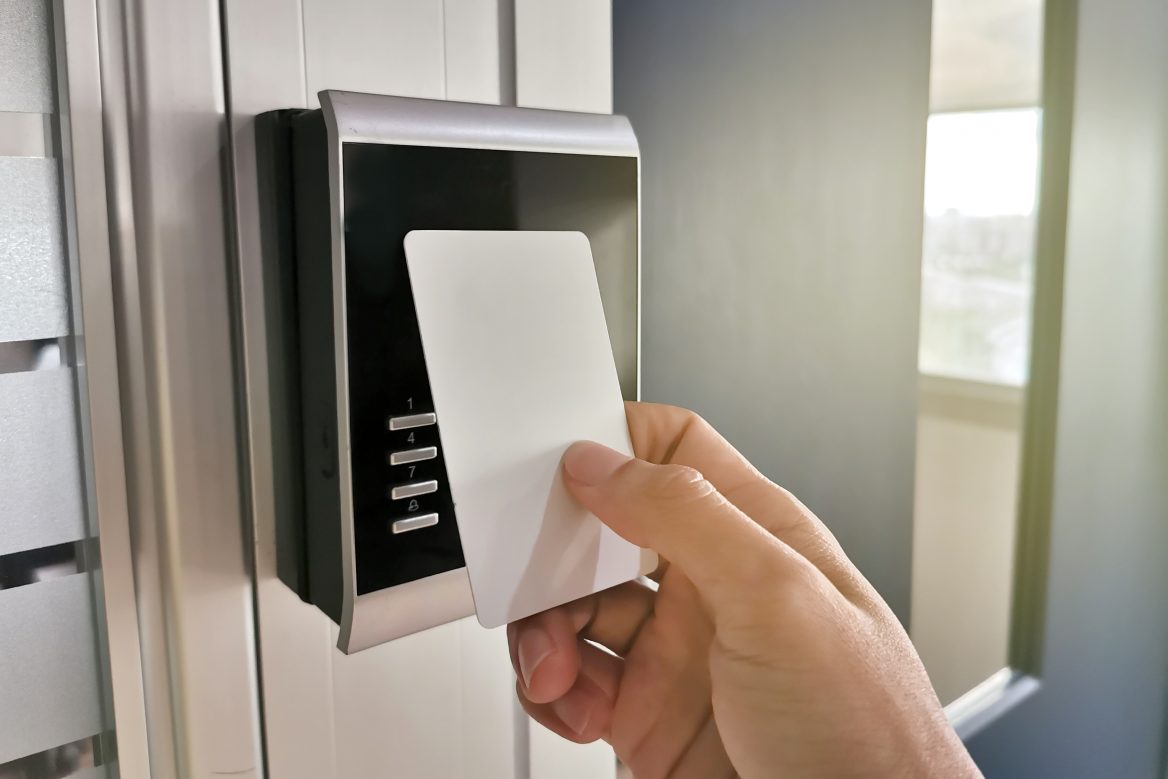Your commercial property’s security is a constant concern when you own or manage commercial real estate. Vandalism or break-ins can cause damage and significantly reduce your property’s value. Proper safety measures protect your investment.
Security features are also the best way to demonstrate reliability and trustworthiness to your tenants. Safety and comfort are the two things people want most in a building. Companies that feel unsafe won’t stay at your property for long.
Download Printable Article (PDF) >>>
Here are 10 ways to increase your commercial property’s security.

1. REINFORCE DOORS
Criminals take advantage of weak spots for breaking and entering. Reinforcing the doors on your property will instantly improve tenant safety. They should be made of heavy, sturdy material that can’t be kicked in. However, the hardware matters much more than the door itself.
Most doors are hung with short screws. You should remove these and attach hinges and locks with two and a half-inch screws instead. Longer ones improve security. Ensure your property has a deadbolt and doors have a peephole so tenants can see outside before admitting someone.
2. STRENGTHEN WINDOWS
Windows are another easy point of access for thieves and squatters. Fortunately, reinforcing your windows is easy and relatively inexpensive. Start by adding bar pins to each window — these are more secure than
traditional locks. You can also install tiny alarms to alert you if there’s a security breach.
Add window security film to strengthen the glass. It can protect your property if someone tries to break a window. Consider adding window bars or grates for ground-level windows in less secure areas for extra
protection. Caution tenants to keep all windows closed and locked when leaving the building.
3. ADD SECURITY CAMERAS
Putting security cameras on your property can also deter criminal activity. Studies show that they are most effective when combined with other security measures like lighting and alarm systems. However, even fake
cameras are enough to scare potential intruders away in some cases.
Position your cameras in places where they can see and be seen. There should be plenty of light, but avoid directing cameras toward the sunrise or sunset so they’re not blinded. Check your commercial property’s security footage periodically for suspicious activity. Some cameras have a voice function that allows you to ask questions or warn intruders away.
4. ESTABLISH AN OFFICE
Another way to enhance a commercial property’s security security is by setting up a local office where people can go to report suspicious activity and express any concerns they may have. Your tenants will naturally know what’s going on in the neighborhood.
Setting up a local office gives you a direct line to the area and makes tenants feel supported. Maintaining a constant presence near your property also reduces the likelihood that break-ins or squatters could go unnoticed. Your tenants and real estate investments will have an extra layer of protection if someone is always watching nearby.
5. SECURE PACKAGING GARAGES
You should also secure any parking garages on your commercial property. They are often the scene of crimes on TV because they’re dark, isolated and a good place to meet someone alone. You can protect your tenants by installing quality lighting and alarm systems throughout your garage.
Video surveillance will also deter crime. Many parking garages restrict entry to tenants by using an access code. Changing this information regularly can help keep your garage secure and tenants protected. Consider hiring permanent security guards if your buildings are in a particularly dangerous area.
6. IMPROVE SIGHTLINES
Increased visibility is associated with a reduction in crime. Criminals that can be plainly seen breaking into a building or damaging property will move on to a place with less visibility. You can improve your property sightlines by trimming trees and bushes. All enclosed areas should be securely locked.
Increase visibility in the evening by installing high-quality lighting around your property. Replace burned-out bulbs quickly and advise tenants to keep porch lights turned on year-round. Your buildings should look like impenetrable fortresses from the outside — with no easy way to get in and no real reason to try.
7. ENFORCE RESIDENCY
Everyone has heard horror stories about homeowners going away on vacation and coming back to find squatters in their houses. Unfortunately, this happens with commercial properties, too. You’re most in danger of squatters in the transition from one client to the next, so you must keep a close eye on any empty
properties.
Keep squatters from moving in to protect your property from being destroyed and having the ownership contested. Ask your tenants to notify you before closing for long periods and get the dates so you can check up on these properties. The best way to avoid squatters is with preventive vigilance.
8. MAINTAIN THE PROPERTY
Simple maintenance also doubles as a security measure. When a property looks cared for, criminals assume it’s being watched and are less likely to trespass. Consider the difference between a well-landscaped lawn and one filled with overgrown weeds and unmown grass. Unkempt properties are a magnet for criminal activity.
Doing maintenance also means that you or the people you hire will regularly be present on your property. Only work with companies you trust and choose teams where workers hold each other accountable for honesty and
quality labor. A well-maintained property will attract reliable tenants and ensure their safety.
9. INSTALL FENCING
Another way to improve a commercial property’s security is to install quality fencing. This gives tenants an added sense of security and shows that you’re serious about their privacy and safety. It defines your property line and allows you to physically and psychologically claim ownership of an area.
Fences are an important type of signage — they tell people where your property begins and ends and let outsiders know they’re not welcome. Choose fencing that’s sturdy, attractive and easy to maintain. There should be multiple ways to access the fenced area, all securely locked.
Tenants should continue to lock their back doors regardless of whether they have a fenced yard.
10. CHANGE THE LOCKS
You should also periodically change all locks on your commercial property. Keys can get copied or lost very easily. Your previous tenants shouldn’t have access to the building after new ones have moved in. Changing the locks every so often ensures it’s always secure and few people have access.
Exterior doors should always have deadbolts in addition to keyhole locks. Assess each entryway to ensure it’s secure — sometimes, people can reach interior locks through a mail slot. Avoid locks that can be cut apart or
easily opened with a lock-picking kit. You should also secure basement and garage doors.
Managing your commercial property’s security
Your commercial property’s security is a top concern for anyone who owns or manages commercial real estate. Maintaining a safe perimeter around your properties enhances their reputation in the community and protects your investment. It also provides your tenants with the safety they’re looking for.
Follow these 10 principles to enhance your commercial property’s security. Security measures work best when combined, so don’t stop with only one. Multiple physical and psychological barriers will help protect your
property from defacement, damage and loss. Layers of security will also give you and your tenants peace of mind.
Rose Morrison is a residential and commercial real estate writer and the managing editor of Renovated. To see more of her work visit: https://renovated.com/


